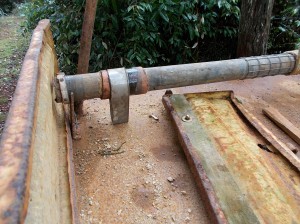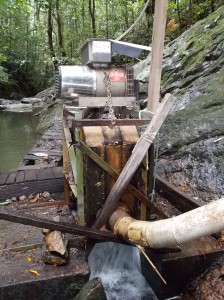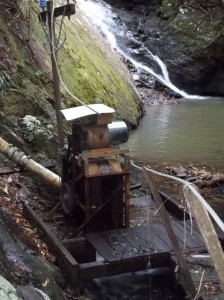This is not a spam from an Indian pharmaceutical firm, this is how to erect a power pole. They are long. They are heavy. Even half a dozen strong men can’t lift them as you can’t push past the centre of gravity so the pole has all the leverage. So this is about how to get the pole in the hole without serious physical injury. Something I am sure everybody needs to know. So the pole is 7.5m long and weighs 250-300 kg. I need to move it 25m away and replant, having been smashed to the ground by a falling tree. I offer you a picture of my mobile crane.
The mobile bit is because it is mounted on the back of my superbly rusted 1982 Toyota Hilux. The crane bit is because I can lift it off the ground into the vertical position with a few bit of pipes, rope and other assorted junk. On my own, in perfect control every step of the way. The horizontal pipe at the back of the tray is a bit of broken pipe from the ram pump. The A-frame steel pipe is left over from the shed construction. The handle of the windlass is spare plumbing parts. Equally sophisticated is the the stop mechanism which is a stick that can slide in and out on the tray support beams. At the top of the A-frame is a pulley for a rope turned from a small offcut of red stringy. Superbly strong wood. The A-frame is tied back to the bull bar by a stainless steel wire I can barely see.
This close up shows the windlass pipe in cradles and hold-down loops of stainless steel recycled from a defunct water pump I think.
 The feet of the A-frame sit on bolts sticking through the tray. Total cost of this contraption:- zero. Total utility of this contraption, well, I didn’t have any other way.
The feet of the A-frame sit on bolts sticking through the tray. Total cost of this contraption:- zero. Total utility of this contraption, well, I didn’t have any other way.
While I was on my way down from pole erection, I ran across this little critter which I reckon has to be a legless lizard.
I haven’t seen anything like it before in my decades at Possum Valley. It seems to have a bit of a neck, not seen in snakes and is only 30 cm long. It seemed to have a head like a skink, with a slight neck between the head and body. It was very docile and obligingly remained for the several minutes it took me to go for my camera. Grey on top, banded yellow and black underneath.
I would welcome advice from anybody who knows what it is.









Lipstick on Pigs
I notice in recent months that some banks are advertising that you can really love a bank. Er, no, you can’t. Banks are corporations and legal vehicles, heartless and soulless, dedicated to making money for their shareholders. Its senior officers are required by law to maximise returns, destroy the opposition, take money off anyone silly enough to let them and deposit it in shareholders pockets, and generally stomp on heads. To get into the higher echelons of bank management requires a great track record of head stomping. They are monster machines of human construct run by ruthless kleptomaniacs.
You may think this view a tad extreme. I am just sorry that I haven’t the wit to present reality in bolder terms and in all its lurid details. Throughout most of the last couple of millennium, the financial sector has been about 5-10% of the economy. Ancient Egypt had bankers, and the Romans had more. In the last few decades, the financial sector has blown out to over 30% of the economy in many western countries. I would like to point out that banks don’t actually make anything essential to human happiness or survival, they just collect rent. They take a percentage of any activity or action and many that you didn’t even know you are doing. Paying for groceries, filling the tank of the family car, getting a haircut (how apt), or anything you do gives them a pay-off. It used to be that there was a cut-off point where small fees were not worth collecting. With the advent of computers automatically creaming off even tiny amounts, it can add up to billions.
A lot of what the financial sector does is totally in the realms of fantasy. Bundling up other peoples debt, confusing, conflating and re-branding it as an asset, and then on-selling it with names like derivatives, credit default swaps, etc. Millions of people world wide are extravagantly paid to play these on-line casino games with other people’s money. This crazy virtual market is apparently worth 10 times the world’s GDP. I mentioned money, but that too is becoming a very dodgy concept, being created by central banks out of nothing. Just a few key strokes sends billions or trillions to the banks. When you got a mortgage, did you think the banks had a pile of cash out the back to pay the seller? Nope, the credit (not cash) was invented on the spot. To pay back the phantom money, you have to labour for a few decades doing real work in the real world and donate up to half your income to a bank that never had the money in the first place.
You may be wondering how I came to have such a jaded view of banks. Again, words fail me as I am well beyond jaded, and well into cynical, bitter and twisted and more than slightly miffed. I bank with Westpac. They shall be the nominal villains, but any bank would do as well. Three decades ago I was in Cairns with baby Alice in my arms, my wife Hilary half way through pregnancy in Cairns Base hospital undergoing an operation to remove an ovarian cyst. I attempted to withdraw some money from an ATM. It swallowed the card. I went into the Westpac bank to sort it out but they wouldn’t give me any money from my account without the card. They couldn’t get it out of the ATM, fax down a copy of my signature from Atherton bank or verify my identity from my driver’s licence. I had my wife’s card, but they wanted her signature to go with it, but she was being sliced and diced right then, so Alice and I were literally pushed out the door. All I wanted was $30. Fortunately a caravan park was more trusting or we’d have been on a park bench for the night.
I have lots of skills and I’m widely read on many diverse subjects. Money and finance are not amongst them. As part of a management course at uni accounting was required. In the first lecture I soon fell asleep to the gentle, lulling, lisping tones of the pinstriped lecturer despite the seating being specifically designed for maximum pain to stop student slumber. Never went to another. No point risking permanent spine damage. So when Westpac offered the free services of a financial planner, I naively accepted as I’d never come across the concept of planning one’s finances before. So I trustingly bared the pathetic state of my total worth to him, confessing that I’d only ever earned enough to pay tax in two years, long, long ago and I earned a meagre living selling carved bowls at local markets. I thought he might laugh and storm out in high dudgeon for wasting his time, but no, the wise and caring advisor had something for me called ‘superannuation’. Sounded super as you apparently put a little bit in and later on get a lot out. True to my usual form, it was several years before I even bothered to look at the bits of paper Westpac had been sending me. From every payment I put in, 15% had been deducted as well as considerable monthly ‘management fees’. Still the penny didn’t drop, even though my money was evaporating before my eyes. Very slowly, (I mostly think very slowly), it dawned on me that there isn’t any management as my tiny bit of money is pooled. One person can ‘manage’ the whole investment portfolio from a single desk and still get the afternoon off to get the hair done or play golf. But each contributor is charged individually. Outrageous! Even more egregiously, the financial planner knew I was paying no tax but hooked me into a scheme where I was paying 15% up front. He was either grossly incompetent or dishonest, or both. Do not have anything to do with an ‘in-house’ financial planner. They are foot-in-the-door, lying, thieving pedlars. There are good financial planners out there I am sure, but you will have to seek them out yourself, interview them to be sure they understand what you require, and of course pay them.
My last story is too complex to describe, but I was trying to send some money to a person in Indonesia. I tried on-line and failed. I went into Westpac and the manager herself tried and failed. Two months of frustration could not resolve the issue. The amazing thing was that the banks don’t communicate with each other. Any information I could gather was by me e-mailing my Indonesian friend to see what could be seen at the other end. The path in between is opaque. I was being charged large fees for no service. Here in fairness, I should state that I think most of the problem was with corruption in the Indonesian bank. Westpac never did manage to make the simple transfer. I went via Western Union who charge humongous fees (about A$370), but have obviously paid off the right people.
This post has rambled on beyond what I had in mind, because I find there is more to what I feel than I had supposed. And I have a last word. Don’t take out your frustration on the person in front of you. In any organisation bigger than a few employees, you can’t even get near the heartless, conniving, rapacious plutocrats who are fucking you about. The person in front of you is a long suffering minion of the system. Probably quite human. I have gone into an office really angry, fuming at the treatment and obfuscation I am receiving, but taken the time to tell the person I am seeing that my anger is with the system, not with you. Maintain the rage, but don’t direct it at the innocent.
Totally unrelated picture